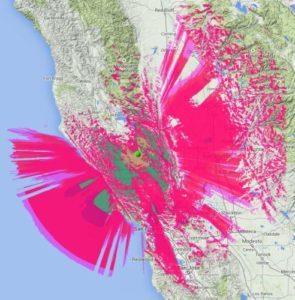Pacifica Network affiliate KBBF of Santa Rosa, California has been an established bilingual radio station since 1973. In October they were confronted with the California fires. Pacifica Network had an opportunity to speak with the Bilingual Broadcasting Foundation’s President, Alicia Sanchez along with KBBF’s Program Director Edgar Avila about how they were able to help those in the Spanish speaking community through one of the worst natural disasters in California history.
KBBF’s Mission Statement
“To create a strong multilingual voice that empowers and engages the community to achieve social justice through education, celebration of culture and local and international news coverage.”
First Responders in Spanish Media
Early on the morning of Monday, October 9, 2017 KBBF volunteers coordinated how they were going to start to address the issue at hand. Program Director Edgar Avila along with a morning show DJ, Francisco Pardo, called different stations to find who was still on air. Because of evacuations hardly any Spanish or english stations were broadcasting. They turned to an english station south of Santa Rosa in order to get information concerning evacuation areas, shelter locations, and emergency contact information. The moment Avila and Pardo got this information they started to translate and broadcast it in Spanish. By Tuesday Avila decided to preempt programming. Starting 6am the next morning (Tuesday) all programing surrounded the disaster and was in Spanish.
Because of the lack of Spanish language press conferences KBBF translated the conferences on their own. Utilizing live streaming, Sanchez says, “ We listened in and translated the conference to be broadcasted in Spanish. When there would be a good place to break another translator would take over and continue with the translating. Me and Edgar kept going back and forth this way.”
KBBF also took calls from the community, they gathered questions the community had and on Wednesday Sanchez attended a press conference in person with a list of the questions in hand. Many people were concerned that if they would go to a shelter they would be asked about their immigration status. After Sanchez confirmed that would not be the case, KBBF encouraged people to go to the shelter to find a roof over their head and basic supplies. But their community was not only listening in to KBBF, they were showing up to volunteer and contribute.
Utilizing Volunteers
Sanchez relates, “Edgar and Francisco where the first ones to be airing, and as the time went on people just started to show up non stop!” This continued for days. In order for programmers to be on air nonstop everyday from 6am to 11pm, sometimes as late as 1am, there had to be a schedule.
Avila assigned time slots to volunteers during the day. Like putting puzzle pieces together he had to make sure those on air complimented each other’s style, as well as making sure that no one was overworked. When evening producer’s came in for their shows Avila provided content that needed to be broadcasted and handed over the management of the sound board for that slot.
In addition to managing the schedule, Avila ensured new information kept flowing. Because many of the volunteers didn’t have a journalism background he turned to friends that had experience in the field. With their help they were able to research new information in a timely fashion and get it translated and ready for broadcasting, with additional support from volunteers. Avila praised volunteers, he said that on top of broadcasting and managing the boards, many were very talented in filling time with music, comforting words, and taking phone calls in order to avoid dead air while being live, “they made it work”, he said.
Mutual Generosity
Because of continued skepticism about shelters, many in the Spanish speaking community avoided them. Becoming more aware of this, volunteers from KBBF started to gather supplies at the station to create a makeshift shelter. People could not sleep there but they could get necessities such as food, clothing, toothpaste, and diapers. People flocked to the station for relief and also for a chance to help their community through KBBF airwaves. Sanchez told of a women with two high schoolers who came to KBBF and decided to stay for hours in order to help translate. Many people brought whatever they could spare in order to say thank you.
Months before the disaster, KBBF planned to do a fundraiser that would take place during the week of of October 13th. Initially, Sanchez said she didn’t want to go ahead with the fundraiser. She felt that the community had lost so much there would be nothing to give. Sanchez said Avila reminded her, “we need this fundraiser so that the community can help us continue to serve the community.” All donations would go to keeping the station going, not to anyone’s salaries. They decided to go ahead with the fundraiser. The station encouraged people to donate online but many came to the station. Sanchez says, “The people who came in were so thankful for the information in Spanish because no other station was doing it. It wasn’t until almost the second week that other commercial stations jumped in and started to get some information out in Spanish. People found it so comforting to turn on their radio and hear Spanish and in some places the internet was down so it was only through the radio they were getting their information. The love from the Spanish speaking community showed us that we were really serving our purpose.”
Through the generosity of volunteers time and energy, KBBF was able to stay true to its mission, “To create a strong multilingual voice that empowers and engages the community to achieve social justice through education, celebration of culture and local and international news coverage.” If you would like to read more about KBBF visit their website at kbbf.org.

